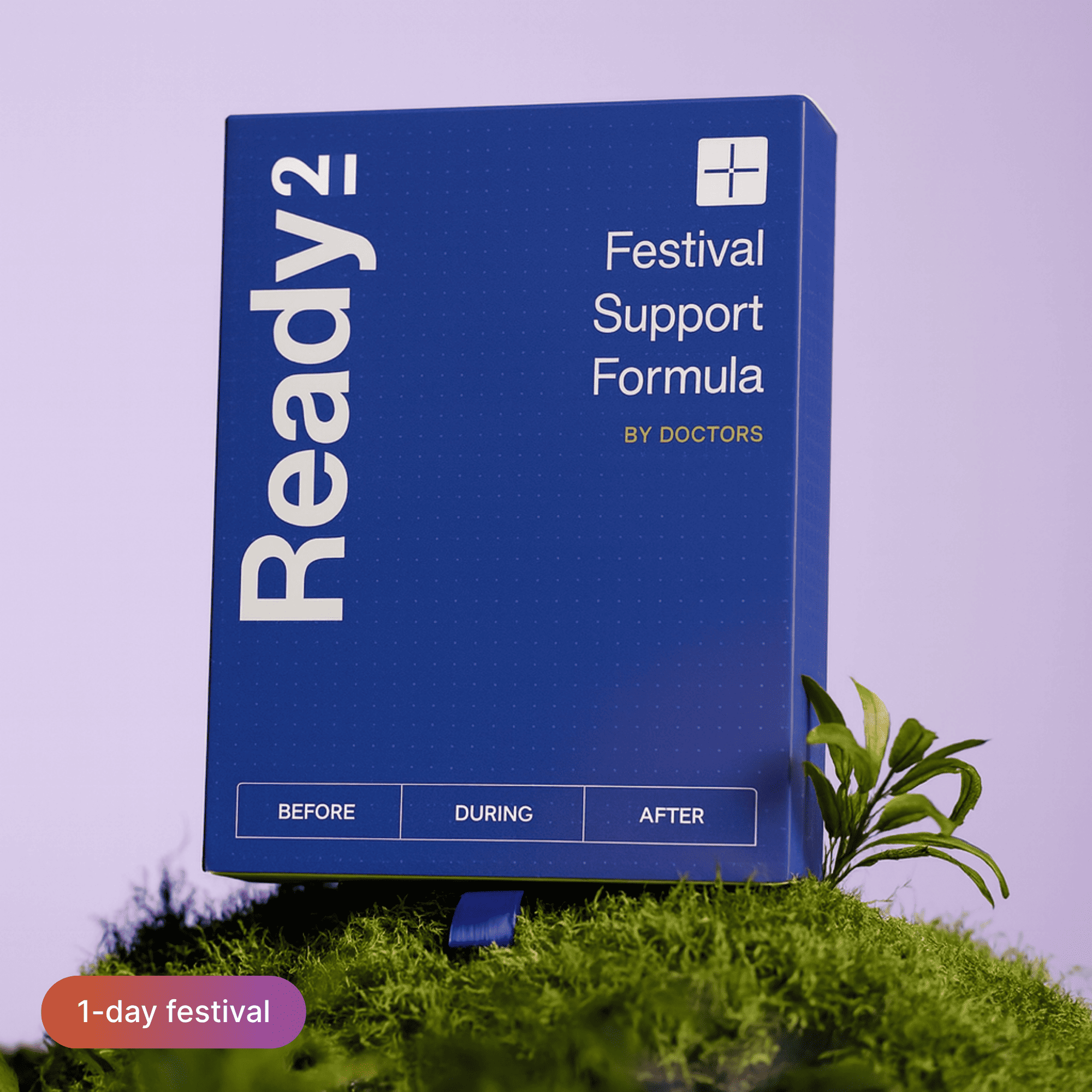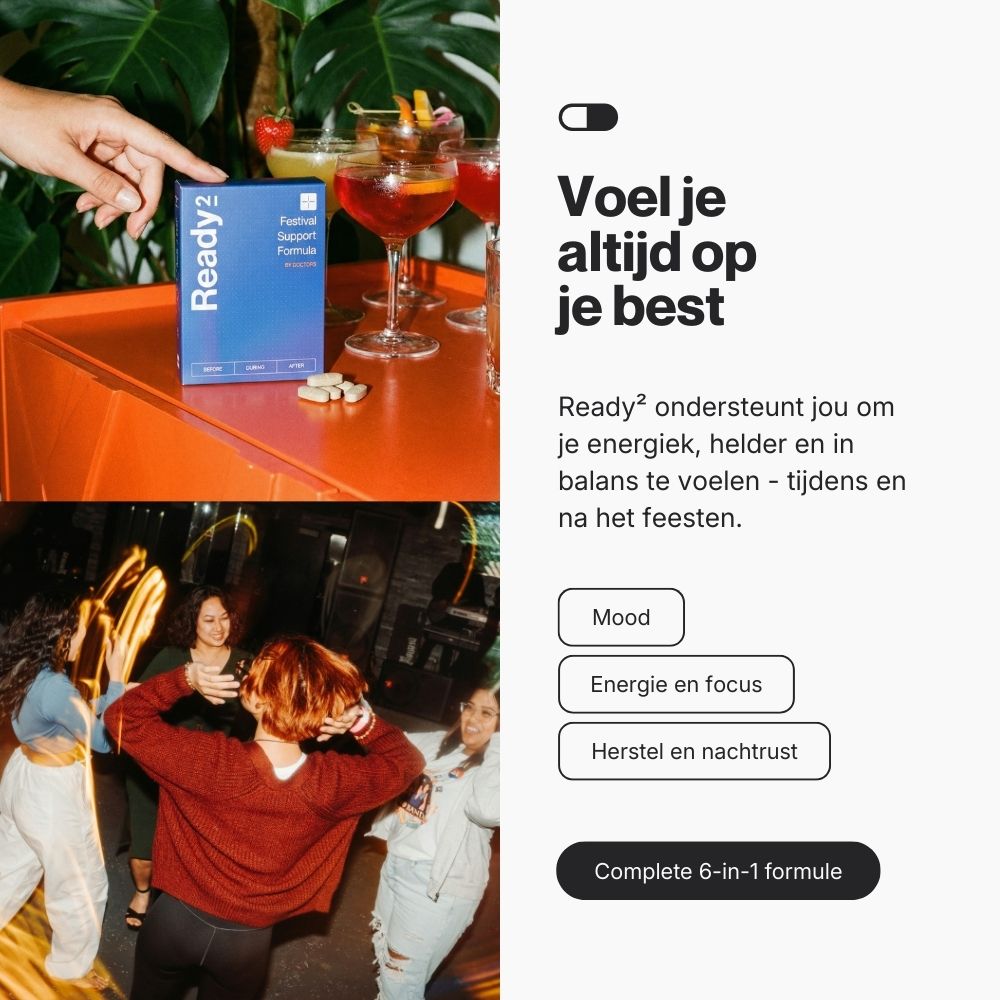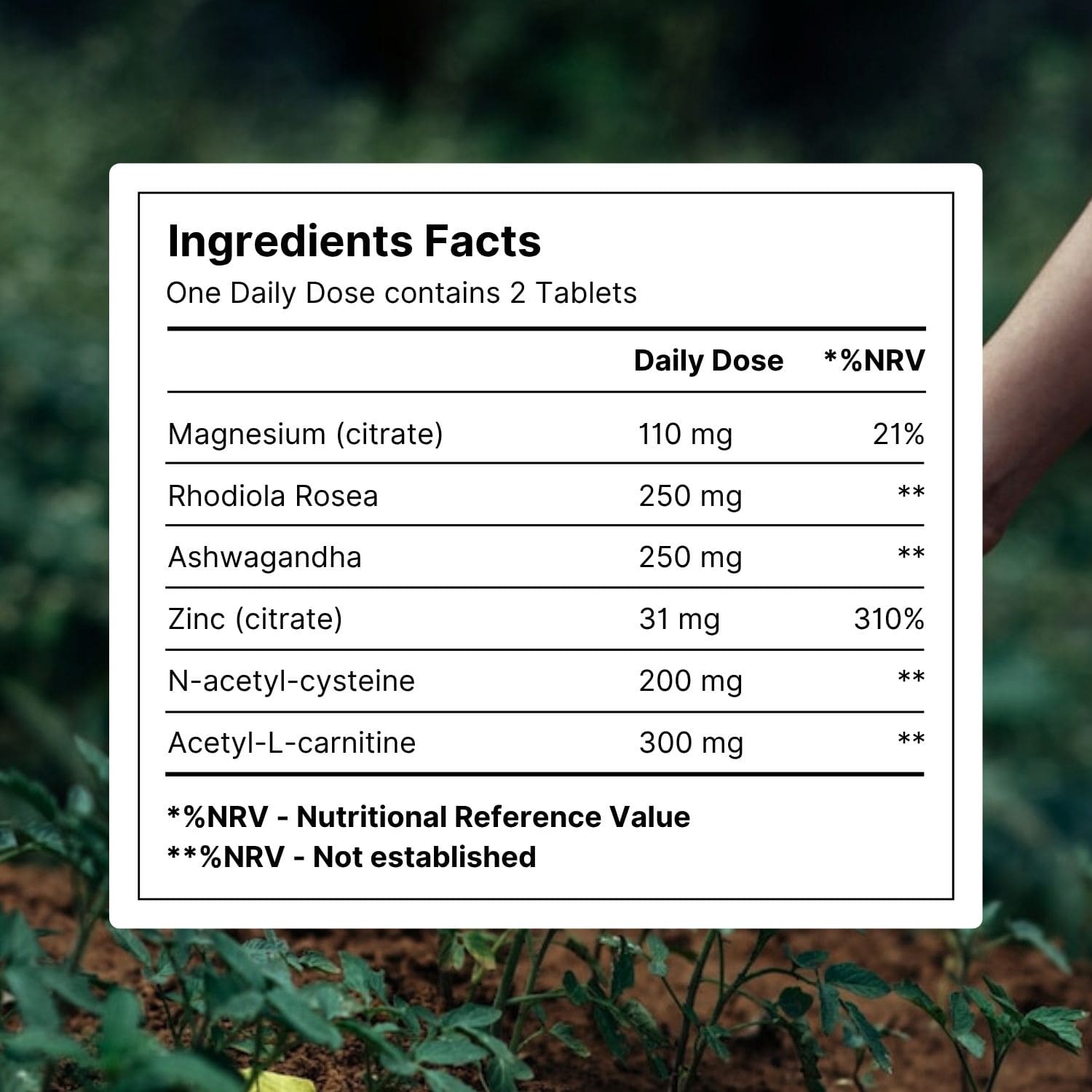
- by Ready2 Team
Recovering after a festival: your complete guide
- by Ready2 Team
Some festivals are the highlight of our year, events we look forward to simply because we know they guarantee a good time. The tent gets packed, outfits are planned and coordinated with your friends, and a schedule is made for the lineup. The only real problem is that you have to be ready for work or school again on Monday or Tuesday. In this article, we give you a crash course in tips on how to recover optimally after an event.
For the more active partygoers among us, an 8-hour, non-stop dance session can be almost equivalent to running a marathon. How many calories do you actually burn, and why is that?
We can distinguish between three types of festival-goers:
The Chiller: This person is primarily there for the atmosphere, the music, and the social gathering. They find a comfortable spot, perhaps a bit further from the stage or on a hill with a good view, and stay there for most of the time. Movement is limited to casual walks to the bar or the toilet. Dancing is minimal; their movement mainly consists of gently swaying to the music.
The Explorer: This is the most common type of festival-goer. The Explorer is dynamic and wants to experience everything. They wander between different stages, explore the food and drink options, meet up with friends scattered across the grounds, and dive into the crowd to dance enthusiastically to their favorite artists. This is interspersed with quieter periods of standing and chatting.
The Hardcore Dancer: This person lives for the music and is at the front of the stage from beginning to end. Their movement is constant and vigorous: not just dancing, but also jumping, stomping, and completely losing themselves in the music. There is relatively little walking between stages, as their focus is on one or two favorite stages.
We have created a formula (highly simplified, so allow for a 10-15% margin of error on the result!) that calculates your calorie needs per type.
Prolonged movement requires a lot of energy from carbohydrates and fats, of which your body generally has sufficient stores. These substances are converted step-by-step into other compounds, each time releasing energy or other usable molecules that you can then use to move your muscles.
Did you know that humans are among the top mammals in terms of endurance?
A person can sustain this for a very long time, but at some point, you need to recover. For recovery, a combination of active and passive rest is often necessary. Active rest means performing normal daily activities at a low pace, such as household chores and going for walks. Very light exercise can also fall into this category. This is good for the blood circulation in your muscles and ensures a better supply of nutrients and removal of waste products. Passive rest means taking complete rest: lying in bed, sunbathing, sleeping, etc. Alternate these two as much as your practical life allows. If you are already quite fit, a light gym session won't hurt, but take it easy.
We have previously written an article about the best diet for a festival; that article mainly covers your nutrition before and during an event, but these guidelines are almost the same for the days after. If you've had an intense festival and haven't eaten much, you'll want to eat slightly above your daily calorie needs. If you took it easy and drank a lot, you can aim for at or just below your calorie needs. A rule of thumb for your daily calorie requirement is 30-40 times your body weight in kg. A person weighing 80kg would then need 2400-3200 calories per day. The lower end of the range applies to less active people, and the upper end to more active people.
And what exactly should you eat?
The ideal is always a combination of proteins, fats, and carbohydrates from complex sources; food that is as unprocessed as possible and full of vitamins, minerals, and other beneficial substances. Fruit, potatoes, fish, and vegetables are almost always good choices, as long as you don't stuff yourself with just one type of food.
For protein, you can aim for 1g per kg of body weight: so 80g of protein, preferably more, for example from 250g of fish/meat or, for the more environmentally conscious, from a combination of quark, nuts, or protein bars.
For carbohydrates, a range of 3 to 5 times your body weight applies; so 240 to 400g of carbohydrates. Make choices primarily from fruit, rice, potatoes, and bulgur. If you want more processed carbohydrates from pasta, lasagna, or a rice dish, that's completely fine, of course. Just add some fruit, vegetables, or soup around the meal to balance it out.
What's left can be allocated to fats. This comes down to 40-80g, and often the delicious meals that are high in protein or carbohydrates already contain a fair amount of fat. It's important to know that dietary fat does not correspond one-to-one with body fat; as long as you are at or below your calorie needs, especially if you move a lot, fat intake is not a problem and is even necessary. Nuts are often a good choice, although you can quickly go over your limits with them. A small piece of cheese, full-fat yogurt, and fatty fish are also good sources in moderation.
You are bombarded with an intense amount of stimuli on a day like that. Of course, that's what we come for, but it does mean we need to decompress the day after. Just like with physical activity, a combination of active and passive rest is needed for mental recovery. Active rest includes things like doing a puzzle, watching Netflix, or going for a walk (which is especially good for the brain!). With passive rest, you simply do nothing at all: take a nap, meditate, sunbathe, etc. Many emotions are also shared with your group of friends (or total strangers), both positive and negative. Sharing or discussing these again can in many cases also strengthen your bond and act as a kind of 'discharge' for your brain.
Good sleep hygiene is essential to give your body the rest it needs to rebuild all kinds of tissues and process waste products. Sleep hygiene includes all the habits you have around your sleep. This means no phone before bedtime, using your bed only for sleep and sex (so no TV!), going to bed at consistent times, and also avoiding alcohol, caffeine, or cigarettes in the evening.
The duration of your sleep is very personal, and most people know what they need. It is advisable to sleep between 6 and 9 hours if you want to be fit again on Monday. Consistency is also very important here, so that your body starts preparing to fall asleep several hours in advance each day, but also produces the right substances to wake up energized in the morning. It is important not to stay in bed too long in the morning and to go outside daily (especially in the morning for sunlight).
Sleep medication is generally not recommended, but taking melatonin once a week certainly won't hurt if it means you can at least get a full night's sleep.
There are very few supplements that have a proven positive effect on your recovery in the days after an event. The golden rule is always: nutrition, sleep, and stress optimization are the most important. However, there are a few substances that can give you that little push to get back on track.
The following supplements can help with a good night's sleep: melatonin, valerian, lemon balm, vitamin B6, zinc, and magnesium.
Do you need more energy but don't want to drink endless cups of coffee? Then opt for rhodiola rosea, vitamin B complex, or acetylcarnitine.
Are you looking for a natural way to feel calmer or less anxious? Go for magnesium, panax ginseng, or ashwagandha.
What about 5-HTP? One thing is for sure, do NOT take it before or during a festival, to prevent serious side-effects. Taking it after an event is hit or miss; some react very well to it, most have a slight or neutral effect. It is worth testing if you're sensitive for a Tuesday dip. See our other articles for more information on this topic.
To wrap it all up, focus on a combination of both active and passive physical rest to let your body recuperate. At the same time, give your brain a break with a mix of light mental activities and doing nothing at all. Fuel your recovery with a varied diet from complex sources, but don't be afraid to have a little treat here and there. Ensure you get at least 6 hours of sleep, and preferably a bit more, by putting your phone away and avoiding caffeine or alcohol before bed. Finally, consider nutritional supplements to give yourself that extra little boost you might need.
In our Ready2 supplement, we have incorporated several of the aforementioned ingredients that have been scientifically proven to support the body and brain during periods of stress and assist with metabolism. The combination of antioxidants, adaptogens, and minerals can provide that extra edge to help you start your new week feeling relaxed after a party!
Last but not least, it is very important to educate yourself on the the risks with festivals and learn ways to take care of yourself in a durable way:






Our medical team designed Ready² to support your body and mind during and after intense days or festivals. So you will feel like yourself much quicker and skip those horrible mondays.
This product contains 6 tablets for 3 doses.
Share:
Your Festivalchecklist
What are neurotransmitters?